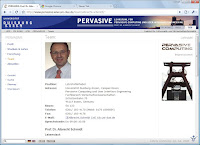Tag: search
Google chrome, secrets, the power of search engines
 Lots of people downloaded Google chrome during the conference. And it seemed that google managed to keep secret till the date it is launched – they managed that before with other released… given the quality of the software that seems realy hard – or not?
Lots of people downloaded Google chrome during the conference. And it seemed that google managed to keep secret till the date it is launched – they managed that before with other released… given the quality of the software that seems realy hard – or not?
How does google manage to keep its developments secret? One random though is: keeping a secret is much easier if you have control over everyone’s search engine and can decided what shows up and what not…
 Just thinking of this it shows again the power the search engine company has over the user… Perhaps I should again get used to searching regularly with different search engines (e.g. http://www.cuil.com/ crawls and have their own index). Perhaps there could be a small project to create a search site that combines results from different sources (… hostory repeats… metasearch engines were popular in the 90s before altavista came along).
Just thinking of this it shows again the power the search engine company has over the user… Perhaps I should again get used to searching regularly with different search engines (e.g. http://www.cuil.com/ crawls and have their own index). Perhaps there could be a small project to create a search site that combines results from different sources (… hostory repeats… metasearch engines were popular in the 90s before altavista came along).
PS: seems that the new browser works reasonably fast and rendering is OK.
the count down started – about 5 weeks to the prototype
Yesterday our summer project started at
Creating a new special purpose search service – basically from the rough idea to a working prototype – in 5 weeks seems a bit crazy but I am confident that we get there 😉 In certain areas we already have an idea how much pages we have to crawl and how much content we have to analyze.
It is interesting that it already now becomes apparent that user interface issues and system architecture decisions are closely linked. E.g. doing a meta search while the user is waiting requires some other content that we can present while the user is expecting the results.
Deadline for Summer@IAIS soon
For more information please see: www.iais.fraunhofer.de/summer2007.html

